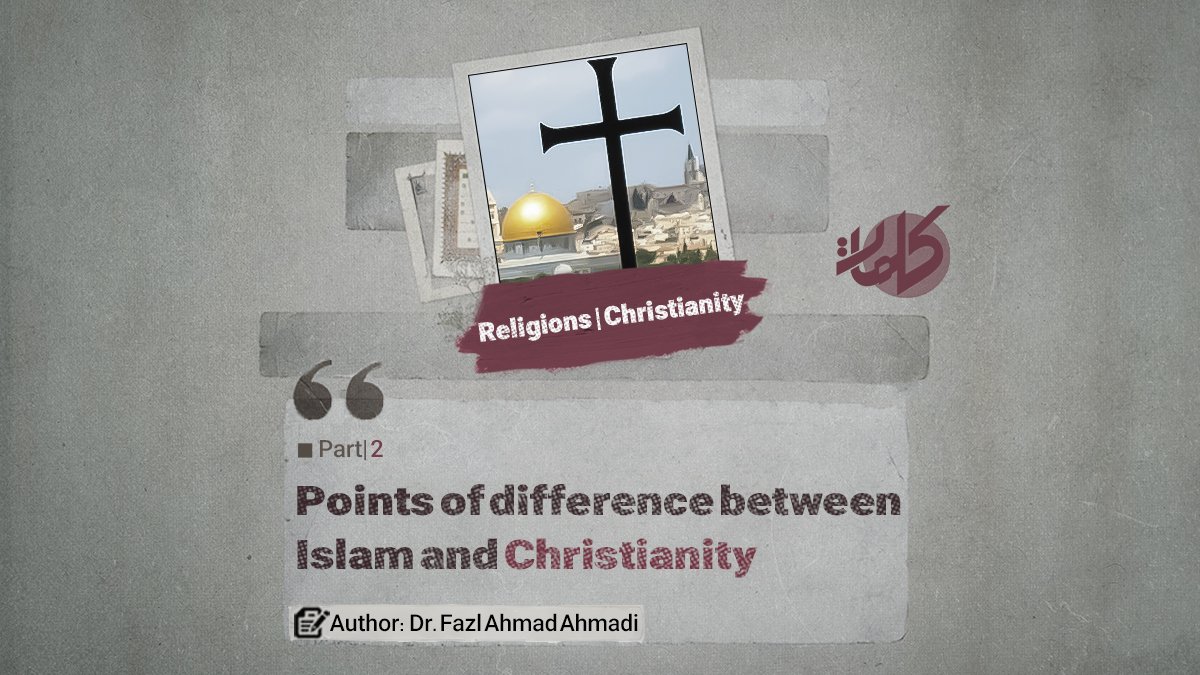Author: Dr. Fazl Ahmad Ahmadi
Points of Difference Between Islam and Christianity (Part Two)
3. Points of Difference
Followers of a religion are often more influenced by its ideological, moral, ritual, and legal structures than by its ultimate message. Therefore, emphasizing the commonality of the divine message does not diminish the structural significance of these aspects in shaping the ideological, psychological, and social characteristics of its followers. In fact, these characteristics largely determine the historical, intellectual, and social evolution of a religion. Considering this, while some differences between Islam and Christianity relate to the inherent nature of these two religions, the psychological and social structures of their followers also play a role (Jam’i, n.d.: 47). Based on this understanding, some of the major differences between Islam and Christianity are discussed below.
A. Sacred Texts
Christianity and Islam have distinct sacred texts. Christianity’s sacred scripture is the Bible, while Islam’s is the Quran. Muslims believe the Gospel was altered or distorted to form the New Testament of Christianity. Conversely, Christians do not share a unified view of the Quran, with most considering it a fabricated or false text.
The Christian Bible comprises the Old Testament and the New Testament. The Old Testament was written over two millennia before the birth of Christ, and the New Testament was written in the decades following His death. Historically, Christians generally believed the entire Bible to be the inspired word of God. However, with the rise of critical analysis during the Enlightenment, diverse perspectives on the Bible’s authenticity and inerrancy emerged within various denominations.
The Quran, revealed in the early 7th century CE, was delivered to Prophet Muhammad (peace be upon him) over 23 years, beginning at the age of 40, and concluded with his passing. The Quran contains narratives that align with the sacred texts of Judaism and Christianity. Some stories are summarized, others elaborated upon, and some diverge entirely. Muslims believe that God revealed the Gospel (Injil in Greek) to Jesus, parts of which were either lost or distorted to form the Hebrew Bible and the Christian New Testament. Muslims also regard the Quran as the only divine scripture preserved from corruption or alteration.
B. The Holy Spirit
Christians and Muslims hold different views on the Holy Spirit. Most Christians believe the Holy Spirit is God and the third person of the Trinity. In Islam, the Holy Spirit is commonly identified as the Angel Gabriel. Many Christians interpret the Paraclete mentioned in the Gospel of John, who appeared at Pentecost, as the Holy Spirit, while most Muslims consider it a prophecy of the advent of Muhammad (peace be upon him).
A key verse about the Paraclete is John 16:7: “But I tell you the truth: It is for your good that I am going away. Unless I go away, the Counselor will not come to you; but if I go, I will send him to you.”
C. On Jesus Christ
In Islam, Jesus (Isa) is regarded as the Messiah sent to guide the Israelites with a new revelation, the Gospel. Christians believe Jesus is the Messiah foretold in the Hebrew scriptures. However, Christianity places far greater emphasis on Jesus, viewing Him as God incarnate and the second person of the Trinity. Belief in Jesus plays a central role in the theology of both religions.
Both Muslims and Christians believe Jesus was born of the Virgin Mary and regard Him as the Messiah. However, they differ on key aspects of His nature. Christians believe Jesus is the incarnate Son of God, divine, and sinless. Islam teaches that Jesus was one of the greatest prophets of God but not divine, not the Son of God, and not part of the Trinity. Muslims also assert that the creation of Jesus was similar to that of Adam (peace be upon him).
Christianity and Islam differ significantly regarding the crucifixion and resurrection of Jesus. Christianity teaches that Jesus was condemned to death by the Sanhedrin and the Roman governor Pontius Pilate, crucified, and resurrected after three days. Islam teaches that Jesus was a human prophet who called people to monotheism (Tawheed). Muslims believe Jesus was condemned to crucifixion but was miraculously saved from execution and ascended to heaven. Instead, it is emphasized in Islam that someone resembling Him was crucified.
Both Christians and Muslims believe in the second coming of Jesus. Christianity does not specify where Jesus will return, while Islamic traditions state He will descend at a white minaret in eastern Damascus (believed to be the Isa Minaret in the Umayyad Mosque). Christians believe Jesus will return to defeat the Antichrist, and Muslims share this belief. Many Christians believe Jesus will then reign for 1,000 years, while Muslims believe He will govern for 40 years, marry, have children, and be buried under the Green Dome.
Continues…
[1] – «إِنَّا نَحْنُ نَزَّلْنَا الذِّكْرَ وَإِنَّا لَهُ لَحَافِظُونَ »، سوره الحجر آیه ۹.
[2] -«يَا أَهْلَ الْكِتَابِ لَا تَغْلُوا فِي دِينِكُمْ وَلَا تَقُولُوا عَلَى اللَّهِ إِلَّا الْحَقَّ إِنَّمَا الْمَسِيحُ عِيسَى ابْنُ مَرْيَمَ رَسُولُ اللَّهِ وَكَلِمَتُهُ أَلْقَاهَا إِلَى مَرْيَمَ وَرُوحٌ مِّنْهُ فَآمِنُوا بِاللَّهِ وَرُسُلِهِ وَلَا تَقُولُوا ثَلَاثَةٌ انتَهُوا خَيْرًا لَّكُمْ إِنَّمَا اللَّهُ إِلَهٌ وَاحِدٌ سُبْحَانَهُ أَن يَكُونَ لَهُ وَلَدٌ لَّهُ مَا فِي السَّمَاوَاتِ وَمَا فِي الْأَرْضِ وَكَفَى بِاللَّهِ وَكِيلًا»، النساء، آیه ۱۷۱.
[3] -«إِنَّ مَثَلَ عِيسَى عِندَ اللَّهِ كَمَثَلِ آدَمَ خَلَقَهُ مِن تُرَابٍ ثُمَّ قَالَ لَهُ كُن فَيَكُونُ»، آل عمران، آیه ۵۹.
[4] «إِذْ قَالَ اللَّهُ يَا عِيسَى إِنِّي مُتَوَفِّيكَ وَرَافِعُكَ إِلَيَّ وَمُطَهِّرُكَ مِنَ الَّذِينَ كَفَرُوا وَجَاعِلُ الَّذِينَ اتَّبَعُوكَ فَوْقَ الَّذِينَ كَفَرُوا إِلَىٰ يَوْمِ الْقِيَامَةِ ثُمَّ إِلَيَّ مَرْجِعُكُمْ فَأَحْكُمُ بَيْنَكُمْ فِيمَا كُنتُمْ فِيهِ تَخْتَلِفُونَ»، سوره آل عمران، آیه ۵۵.
[5] -«وَقَوْلِهِمْ إِنَّا قَتَلْنَا الْمَسِيحَ عِيسَى ابْنَ مَرْيَمَ رَسُولَ اللَّهِ وَمَا قَتَلُوهُ وَمَا صَلَبُوهُ وَلَكِن شُبِّهَ لَهُمْ وَإِنَّ الَّذِينَ اخْتَلَفُوا فِيهِ لَفِي شَكٍّ مِّنْهُ مَا لَهُم بِهِ مِنْ عِلْمٍ إِلَّا اتِّبَاعَ الظَّنِّ وَمَا قَتَلُوهُ يَقِينًا»، النساء، آیه ۱۵۷.



